深圳上海牛津版八年级上_unit_2_Numbers
- 格式:doc
- 大小:94.50 KB
- 文档页数:12
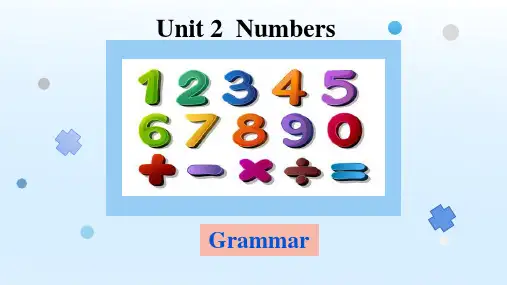
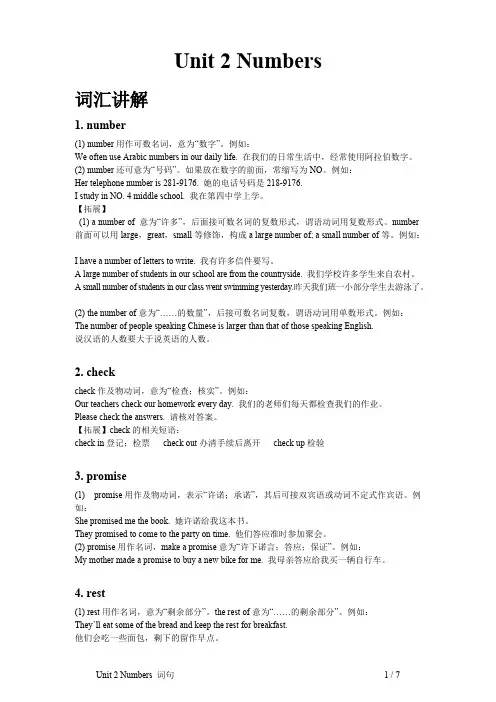
Unit 2 Numbers词汇讲解1. number(1) number用作可数名词,意为“数字”。
例如:We often use Arabic numbers in our daily life. 在我们的日常生活中,经常使用阿拉伯数字。
(2) number还可意为“号码”。
如果放在数字的前面,常缩写为NO。
例如:Her telephone number is 281-9176. 她的电话号码是218-9176.I study in NO. 4 middle school. 我在第四中学上学。
【拓展】(1) a number of 意为“许多”,后面接可数名词的复数形式,谓语动词用复数形式。
number前面可以用large,great,small等修饰,构成a large number of; a small number of等。
例如:I have a number of letters to write. 我有许多信件要写。
A large number of students in our school are from the countryside. 我们学校许多学生来自农村。
A small number of students in our class went swimming yesterday.昨天我们班一小部分学生去游泳了。
(2) the number of意为“……的数量”,后接可数名词复数,谓语动词用单数形式。
例如:The number of people speaking Chinese is larger than that of those speaking English.说汉语的人数要大于说英语的人数。
2. checkcheck作及物动词,意为“检查;核实”。
例如:Our teachers check our homework every day. 我们的老师们每天都检查我们的作业。
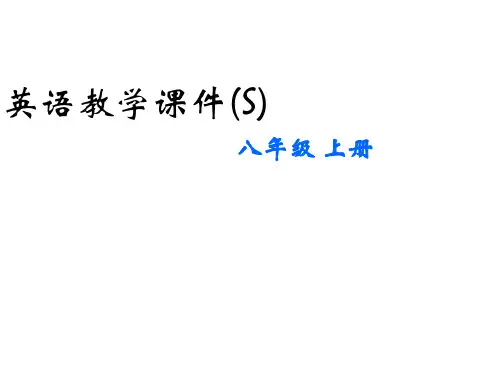
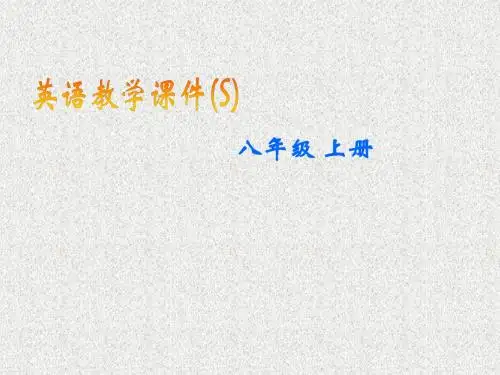
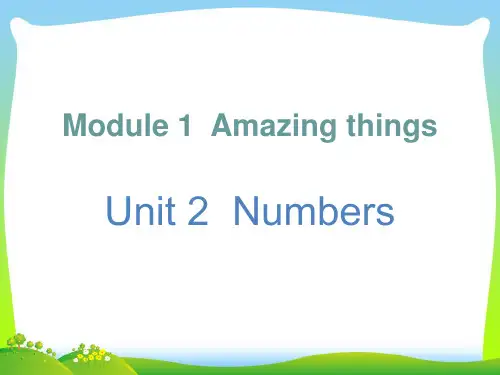
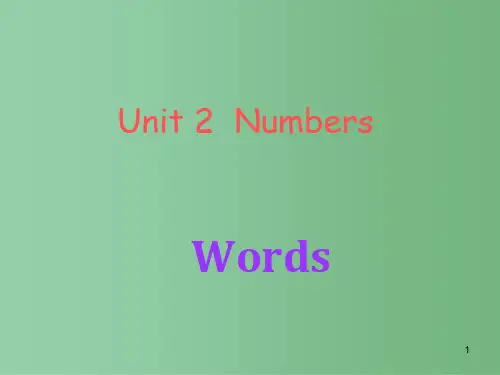
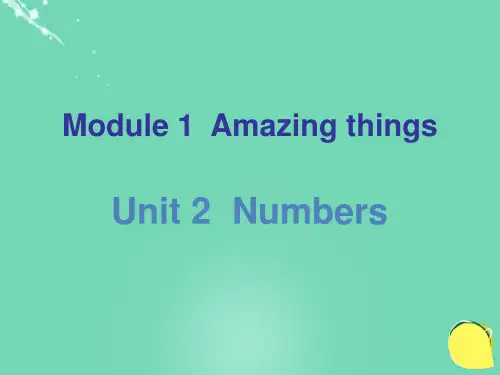
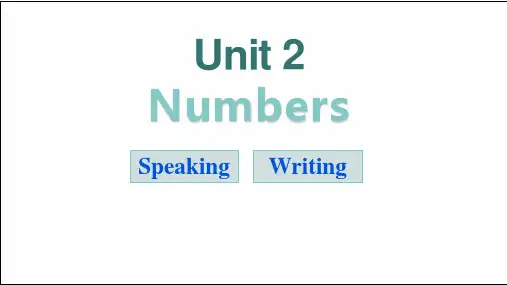
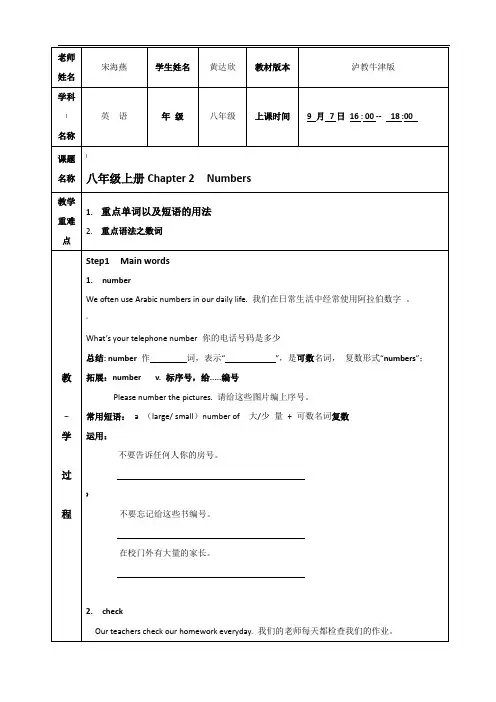
1. About ______ (four fifths; four fifth) of the books in our school library ______ (is; are) written in Chinese.2. The boy always stays there for ______ (one and a half hour; one and a half hours).3. At the age of ______ (thirty; thirtieth), he had his own lab.4. ______ (Two sons their; Their two sons) are in the army."5. ______ (Two-fifth; Two-fifths) of the land in that district _______ (is; are) covered with trees and grass.6. We all like the boy ______ (of ten years old; of age of ten).7. Tom was ______ (first; the first) to get to school and I ______ (ninth; the ninth).8. Every day he begins to do his homework ______ (at ten past seven; until ten).9. Every year, _____ people go to visit their factoryA. a thousand of B thousands C. thousand of D. thousan ds of10. Tom has just finished writing a _________ article.A. nine-hundred-wordsB. nine-hundreds-word》C. nine-hundred-wordD. nine-hundreds-words11. Last year, I visited a chemical factory in Baise, there are about _____ workers in it.A. six thousandsB. six thousandC. six thousands ofD. six thousand of12. Tomorrow is the boy’s ________ birthday.A. seventhB. sevenC. seventeen13. _people will visit Qinzhou during the 12th Games of Guangxi.A. ThousandB. Two thousandsC. Thousands ofD. Thousand of14. Now, everybody, please turn to Page ________ and look at the ________picture .^A. Fifth; fiveB. Five; fifthC. Fifth; fifthD. Five; five15. After the Asian Games, ______ people came to Guangzhou for a visit during holidays.A. thousandB. thousands ofC. five thousandsD. five thousands ofStep 4 能力提升。
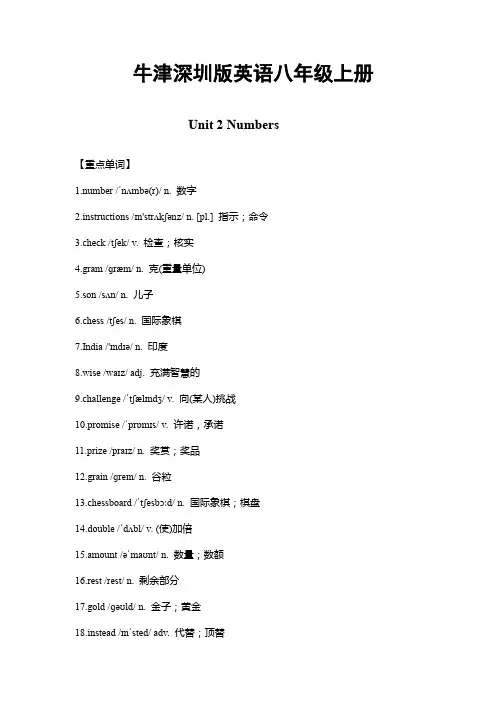
牛津深圳版英语八年级上册Unit 2 Numbers【重点单词】1.number /ˈnʌmbə(r)/ n. 数字2.instructions /ɪn'strʌkʃənz/ n. [pl.] 指示;命令3.check /tʃek/ v. 检查;核实4.gram /ɡræm/ n. 克(重量单位)5.son /sʌn/ n. 儿子6.chess /tʃes/ n. 国际象棋7.India /'ɪndɪə/ n. 印度8.wise /waɪz/ adj. 充满智慧的9.challenge /ˈtʃælɪndʒ/ v. 向(某人)挑战10.promise /ˈprɒmɪs/ v. 许诺,承诺11.prize /praɪz/ n. 奖赏;奖品12.grain /ɡreɪn/ n. 谷粒13.chessboard /ˈtʃesbɔːd/ n. 国际象棋;棋盘14.double /ˈdʌbl/ v. (使)加倍15.amount /əˈmaʊnt/ n. 数量;数额16.rest /rest/ n. 剩余部分17.gold /ɡəʊld/ n. 金子;黄金18.instead /ɪnˈsted/ adv. 代替;顶替19.realize /ˈriːəlaɪz/ v. 认识到;意识到20.copy /ˈkɒpi/ v. 抄写;誊写21.correctly /kəˈrektli/ adv. 准确无误地;正确地22.traffic /ˈtræfɪk/ n. 交通23.accident /ˈæksɪdənt/ n. (交通)事故【重点短语】1.a long time ago 很早以前2.challenge… to… 向(某人)挑战3.and so on ……等等4.copy down 抄写;誊写5.one day (将来)有一天;总有一天;(过去)某一天6.order sb. to do sth. 命令某人做某事7.make money 赚钱8.follow one’s advice 接受某人的建议9.from then on 从那时起10.after that 在那之后11.lead to 导致;通向12.all year round 整年,全年,一年到头13.add...to... 增加……到……【重点句型】1.You can have any prize if you win the game.如果你赢了这场比赛,你可以得到任何奖品。
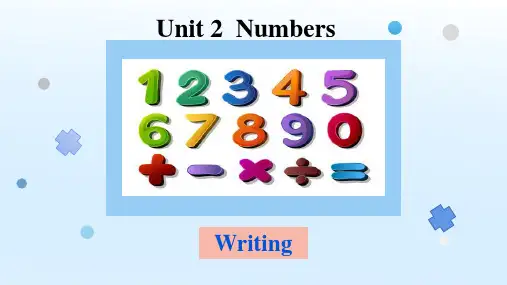
Unit 2 Numbers1.许下/违背诺言2. the rest of3.开始意识到4. a long time ago5.从那以后6. play chess7.copy down 8.follow one’s advice9.发生10.想要做某事11.不但…而且…12.make sb do sth13.禁不住做某事14.make good use of15.命令某人做某事16.all year around1. Check some Maths problems.【考点聚焦】1) check 及物动词,“检查,核实”老师正在检查我们的作业。
The teacher is checking our homework.【拓展】check 的相关短语check in check out check upE.g. I will meet Jane at the station, please _________ what time she will arrive.A. countB. chooseC. checkD. catch2) problem 可数名词,“问题,难题”辨析:problem 与questionproblem有待解决的问题,特别是疑难的问题或令人疑惑的事,人或情况。
常与work out和solve 等搭配solve the problem 解决问题deal with the problem 处理问题question意思相对广泛,指需要解决或解答的具体问题。
常与ask 和answer 搭配ask questions 问问题answer the question 回答问题【拓展】1)have problems in doing sth. 做某事有困难2)没问题。
E.g. The food safety is a serious _______ in our country. We should try to solve it.A.subjectB. programC. problemD. question2. One day, a wise old man came to the palace and the king challenged him to agame.1) one day “某一天,有一天”课前检测辨析:one day与some dayI think ,my dream will come true 。
牛津深圳版英语八上Unit 2《Numbers》单元教学设计一. 教材分析牛津深圳版英语八上Unit 2《Numbers》的主题是数字,通过学习本单元,学生将能够掌握基数词和序数词的用法,以及如何用英语表达电话号码、年龄、价格等。
教材内容主要包括对话、词汇、语法和综合任务等,旨在培养学生的听说读写技能,提高他们的语言运用能力。
二. 学情分析八年级的学生已经具备了一定的英语基础,能够听懂简单的日常会话,并能用英语进行简单的交流。
但在本单元的学习中,他们可能对一些特殊情境下数字的表达方式以及语法规则还不够了解,因此需要在教学中进行针对性的指导。
三. 教学目标1.能熟练运用基数词和序数词描述物品数量、顺序等。
2.能用英语正确表达电话号码、年龄、价格等。
3.提高学生的听说读写技能,培养他们运用英语进行交流的能力。
4.培养学生的合作意识和跨文化交际能力。
四. 教学重难点1.重点:基数词和序数词的用法,以及如何用英语表达电话号码、年龄、价格等。
2.难点:特殊情境下数字的表达方式,以及相应的语法规则。
五. 教学方法1.任务型教学法:通过设定各种真实的任务,引导学生参与课堂活动,提高他们的实践能力。
2.情境教学法:创设各种生活情境,让学生在实际语境中学习、运用数字。
3.合作学习法:鼓励学生分组讨论、合作完成任务,培养他们的团队精神。
六. 教学准备1.教学课件:制作包含图片、动画、视频等多媒体资源的课件,帮助学生直观地理解数字。
2.教学材料:准备与数字相关的实物,如卡片、骰子等,用于课堂活动。
3.电话号码、年龄、价格等数据:收集一些真实的电话号码、年龄、价格等数据,用于课堂练习。
七. 教学过程1.导入(5分钟)利用图片、动画等引导学生关注数字,激发学生的学习兴趣。
教师提问:“Can you count in English? What are your favorite numbers?”,让学生回答,从而自然引入本课的主题。
Unit 2 Numbers---MemoryName________ Class_______I.必背词汇1. India (n.) 印度Indian (n. /adj.) 印度人;印度的2. gold (n./ adj.) 黄金;金制的golden (adj.) 金色的3. realize (v.) 意识到realization (n.) 实现4. correct (v./ adj.) 改正;正确的correctly (adv.) 正确地5. wise (adj.) 充满智慧的wisely (adv.) 聪明地wisdom (n.) 智慧6. challenge (v./ n.) 挑战challenging (adj.) 有挑战性的challenger (n.) 挑战者II.必备词组1. in your daily life 在你的日常生活中13. from then on 从那以后2. a long time ago 很久以前14. not…any more 不再3. play chess 下棋15. all year around 一年到头4. a wise old man 一个智慧的老人16. take place 发生5. challenge sb. to…向某人挑战…17. and so on 等等6. promise to do sth 承诺去做某事18. copy down 抄写7. double the amount 把数量翻倍19. write a report 写一篇报告8. the rest of…其余的20. traffic accident 交通事故9. order sb to do sth 命令某人去做21. in this way 用这种方法10. realize the problem 意识到了问题22. so that 如此,以便于11. win a prize 赢得了一个奖23. the amount of food 食物的数量12. follow the advice 接受建议24. the number of animals 动物的数目II.用英文解释句子。
老师姓名宋海燕学生姓名黄达欣教材版本泸教牛津版学科名称英语年级八年级上课时间9 月7日16 : 00 -- 18 :00 课题名称八年级上册Chapter 2 Numbers教学重难点1.重点单词以及短语的用法2.重点语法之数词教学过程Step1 Main words1. numberWe often use Arabic numbers in our daily life. 我们在日常生活中经常使用阿拉伯数字。
What’s your telephone number? 你的电话号码是多少?总结: number作词,表示“”,是可数名词,复数形式“numbers”;拓展:number v. 标序号,给.....编号Please number the pictures. 请给这些图片编上序号。
常用短语: a (large/ small)number of 大/少量+ 可数名词复数运用:不要告诉任何人你的房号。
不要忘记给这些书编号。
在校门外有大量的家长。
2. checkOur teachers check our homework everyday. 我们的老师每天都检查我们的作业。
Please check the answers. 请核对答案。
总结: check用作词时,意思是“”拓展:check 相关短语:check in 登记,检票check out 办清手续后离开check up 检验运用:你为什么要检查洗手间呢?3. promiseThe King promised the old man a golden ring. 国王许诺给老人一个金戒指。
Promise me you will not waste your time. 答应我,不要浪费自己的时间。
If you make a promise, you should keep it. 如果做出了承诺,就应该遵守。
总结:promise用作词时,意思是“”用作词,意思是“”常用短语:promise sb. sth 承诺给某人某物promise that +从句承诺......promise to do sth. 承诺做某事make a promise(to do)许下承诺,保证运用:. 你承诺给他一辆新自行车吗?他们答应准时来参加聚会。
妈妈许下承诺带我去迪斯尼乐园。
4. restAnd the rest of you will be spared. 我会饶了你们其余的人。
I have free time to rest. 我有空闲时间来休息。
We stopped to have a rest. 我们停下来休息了一下。
总结:rest 用作诃时,意为“”;用作词时,意为“”用作词时,意为“”常用短语:the rest of 剩余的...... have a rest 休息一下运用:我买了5个苹果,其中3个是好的,剩余的是坏的。
他们吃了一些面包,剩余的在冰箱里。
他们休息了半小时。
5. insteadShe is very busy, let’s go instead. 她太忙了,还是让我们代替她去吧。
Instead he set out two options. 相反,他提出两个选择。
总结:instead用作词时,意思是“”辨析:instead 和instead ofinstead 代替,相反位于句首或句末instead of 代替,而不是后接名词、代词或动名词运用:1. Dave went cycling_______________going skating.2. My brother isn’t good at math__________,he is good at English.3. Mr. Zhang likes reading newspapers___________ books.4.l like reading in the library____________in the classroom.5. Yesterday John____________Mr. Zhang gave us talk on American history.6. challengeThis is a global challenge. 这是一项全球性挑战。
It is time to challenge this vision. 现在是时候质疑这种看法了。
总结:challenge用作词时,意思是“”用作词时,意思是“”常用短语:accept a challenge 应战challenge sb to 挑战某人做某事运用:他们会接受挑战吗?中国学生几乎不会质疑老师的观点。
她向我挑战要我跟她打一场网球Step 2 Main phrases1.play chess 下国际象棋2. a long time ago 很早以前3. challenge...to... 向某人挑战4. would like 想要5. and so on 等等6. talk to 和某人交谈7. take...to... 带...去... 8. in a year 一年后9. from then on 从那以后10. not...any more 不再11. take place 发生12. both... and... .....和....都....13. copy down 抄写14. traffic accident 交通事故15. at first 起初16. in this way 用这种方式17. the amount of .......的数量18. all the year around 一年到头同步练习:根据句意从左面选择适当的短语并用其正确形式填空,补全句子。
1. Only ______________ can we solve the problem.2. I decided to study hard to please my parents.3. Mum will ______ me ________the Disney Land.4. I love all kinds of fruit, apples、bananas、oranges _________________.5.Because he hurt my feeling, I want to be his friend .6. ________the teachers the students like the show.7. _________________ there was a King who was loved by all his people.8. Leo, your boss wants to you right now .9. I’ll graduate .10. The this morning, fortunately, nobody was injured.11. --Can you with me?--Of course.12. I didn’t like him, but later I found him a charming(有魅力的) guy.13. Mary want to Jim fight.14. --What you ? --A cup of coffee please.15. --What’s water? -- 3 liters (升).Step 3 Grammar 基数词和序数词基数词:表示数目的词是基数词。
一、基数词的表示方法1. 最基本的数词1 one,2 two,3 three,4 four,5 five,6 six,7 seven,8 eight,9 nine, 10 ten, 11 eleven, 12twelve, 13 thirteen, 14 fourteen, 15 fifteen, 16 sixteen, 17 seventeen, 18 eighteen, 19nineteen,20 twenty, 30 thirty, 40 forty, 50 fifty, 60 sixty, 70 seventy, 80 eighty, 90 ninety, 100 ahundred, 1,000 a thousand 1,000,000 a million, 1,000,000,000 a billion2. 基数词1~12是独立单词,需逐个记忆。
基数词13~19是在个位数的词干后加-teen构成。
其中thirteen, fifteen, eighteen变化不规则。
基数词20~90是在十位数词后面加-ty构成。
基数词21~99是在十位数词后面加上个位数词构成,中间加上连字符“-”。
73 seventy-three 88 eighty-eight3. 三位以上的基数词,在百位和十位之间一般要用连词and。
1, 342 one thousand three hundred and forty-two4. 英语中没有“万”和“亿”,在表示“万”和“亿”时,要按十进位法来推算。
1万可用10千来表示:10,000可写成ten thousand100,000,000可写成a hundred million35,845可写成thirty-five thousand eight hundred and forty-five5. hundred, thousand, million, dozen, score这些词前面如有表示具体数字的词,它们不能加“s”,反之则须加“s”。
three hundred people, thousands of people二、基数词的用法1. 从句子成分上分析,基数词在句中可用作主语、宾语、表语等。
Four of them went to the factory. 他们中的四个人去了工厂。
(主语)I want two. 我要两个。
(宾语)My classmate is eighteen. 我的同学十八岁。
(表语)2. 编号的事物用基数词。
Today we are going to study Lesson Five. 今天我们要学习第五课。
He lives in Room 801. 他住在801房间。
3. 表示“年、月、日”时年份用基数词,日期用序数词,其顺序由小到大。
The accident took place in 2006. 这次事故发生在2006年。
4. 钟点表达法1. 先点后分,顺读法。
如:8:53 eight fifty-three2. 先分后点,倒读法。